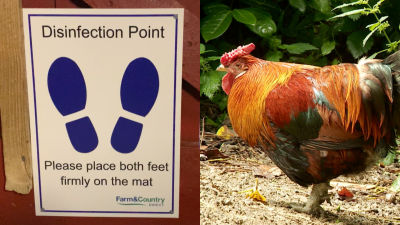Explainer
Find out how to stop the spread of bird flu after cases found in Jersey

Report by ITV Channel's Josh Wilde (Thursday 24 February)
People who come into contact with birds in Jersey are being asked to adopt good biosecurity measures to stop the spread of bird flu.
Two cases were confirmed on Wednesday 23 February after two dead buzzards were found just north of Victoria Village.
Meanwhile the UK is suffering it worst ever outbreak with over 80 cases confirmed since the start of November.
All bird owners there are legally required to keep their animals indoors or they could face fines.
In Jersey the situation is described as low-risk with only two cases found amongst the wild bird population.
Unlike the UK they are not currently forcing owners to keep their birds indoors, although it is recommended.
Jersey's Natural Environment Director Willie Peggie explains why they are not forcing birds to be kept indoors like the UK
However Jersey's government does have the ability to ramp up rules if needed and they are stressing the importance of bird owners following robust measures to stop any spread.
They include making sure domestic birds and poultry do not mix with wild birds, keeping food sources separate and adopting good foot hygiene by disinfecting boots when walking in and out of any enclosures.
Jersey's Natural Environment Director Willie Peggie talks about the measures bird owners can take to stop the spread of bird flu
Bird Flu: Your Questions Answered
What is bird flu?
What is bird flu?
Avian flu is highly infectious and mainly affects birds, although in very rare cases it can transfer to humans and other animals.
The virus is spread through bodily fluids such as saliva and droppings.
It is often passed on by wild birds that migrate from Europe during winter and can be very dangerous for poultry and domestic birds.
What risk is there to humans?
What risk is there to humans?
There is a very low risk of humans catching bird flu.
It usually requires close and regular contact with an infected bird.
A man from South West England was infected in January 2022 but public health officials stressed the risk to the wider public remains very low.
How can we stop it spreading?
How can we stop it spreading?
Members of the public are being asked not to touch unwell or dead birds.
There are specific biosecurity safety measures that farmers are advised to follow, such as keeping birds inside and separating wild birds from domestic ones and poultry.
Jersey Zoo are also rolling out extra measures - geese that usually roam free have been moved to a special enclosure and visitors can no longer enter the Zoo's aviaries as they have been closed to the public.